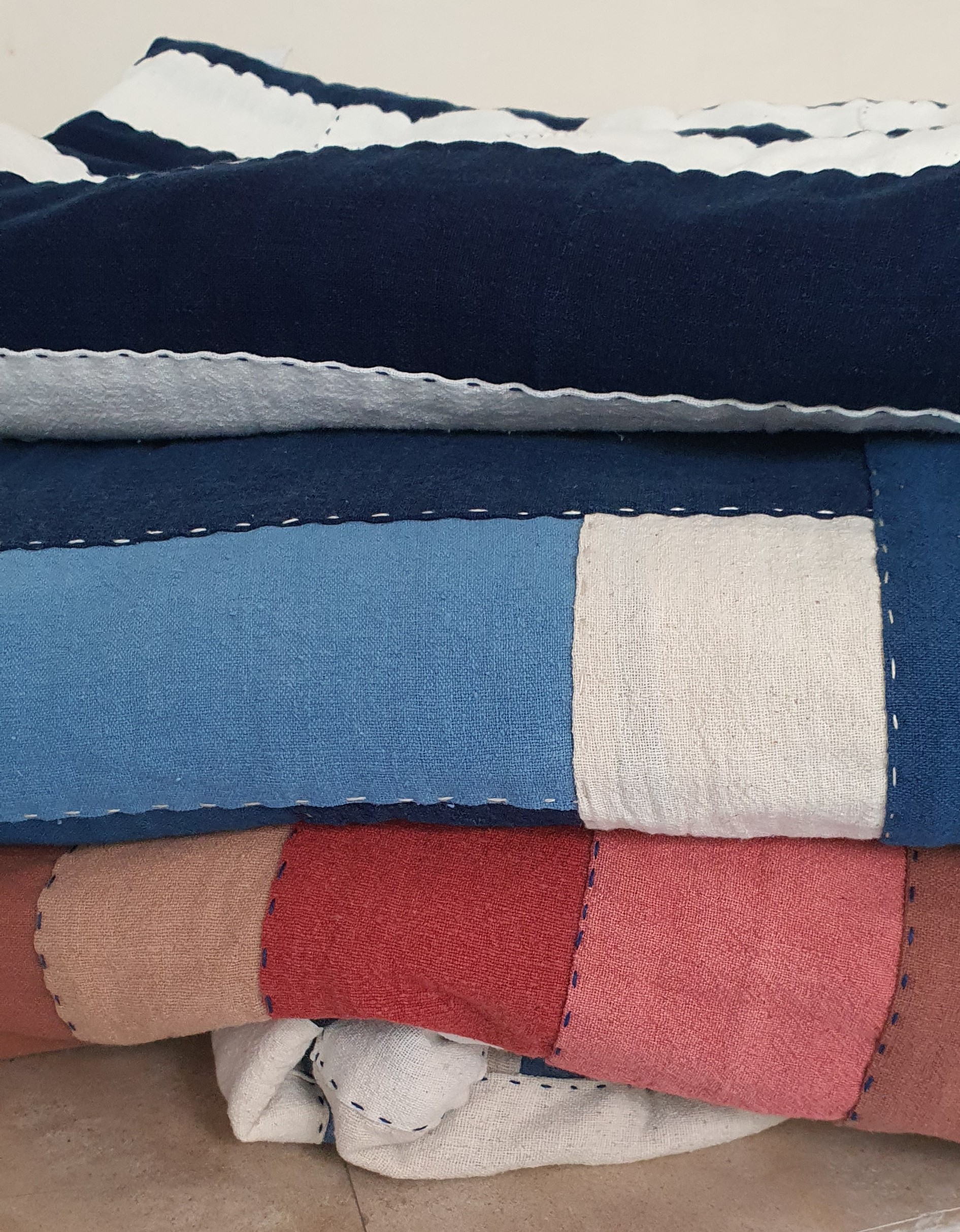We work with a number of weavers to get the cloth we use for clothing and quilt production ….so can access many weights.
I think we might be khadi junkies as we are always on the lookout for new weights and weaves…it is subtle but there is great difference between regions.
Always we are after unbleached cloth, which we later colour by various means.
Our taste runs to the more rustic cloths that have a subtle texture- the handwork involved is obvious in the subtle variations of the hand spun thread and the small changes in tension that happen as the weaver goes through the day.
Is khadi for you?
We ask this in all seriousness,
What can be the charm of khadi could also drive you nuts
- it does have little slubs and bumps in it sometimes
- there can be subtle differences in tension of the weave from weaver to weaver
- we check carefully but occasionally a lump, bump or small gap will be missed and you will receive a garment with a ‘fault’, it happens. Let us know and return it or sell it as a feature of the handmade quality of the item.
- It does take time to produce and so we do have to plan ahead to use it.
- We weight each length of cloth that comes in so see the weight per metre is the same as the last batch which means cloth should be very similar in weight each time you order it…..small variations but very similar.
On the plus side
Khadi is low impact environmentally
- Cotton plant, [wish we could get our hands on organic but we just can’t reliably]
- the raw cotton is picked and ginned to remove the seeds and leaf matter
- Cotton is then carded by hand, this straightens the fibres up like brushing your hair
- It is spun on a hand cranked compound spinning ‘wheel’ -more a gadget than a wheel
- This this then handwoven on wooden looms
- It is then packed and sent onto us.
- We soak it in turkey oil, to release the natural waxy coating found on cotton
- Throw it in the washing machine NOTE first time it sees electricity. We are constructing a reed bed water treatment system and the water goes to our trees after washing
- And it is then ready to be printed or dyed.
Socially, khadi production if done ethically, produces much needed work in poor rural communities.
Here is a fun little video of khadi obsession in action 😘
Are natural dyes for you?
Natural Dye Pallette
- DO NOT Bleach, gentle wash, dry in shade. We label each item. Natural dye will fade gracefully over time, this is to be aware of with natural/traditional dyes. Indigo is washed by us when it comes from dye guy but it will still rub for a wash or two and will slowly fade. We always say will age and fade gracefully with age
- Plain lighter shades of indigo and other traditional colours have an irregular surface- it will look cloudy or streaky
– traditionally all over bold block print/ mud resist designs were used to disguise this. We embrace it as part of the ‘handmade’ feel – you need to consider carefully if it works for you.
PLEASE- Ask for images or carefully check samples in the workshop so you understand what we are talking about.
- Dark indigo is a reliably clear all over colour.
- Raining time and winter fogs all work slows down or stops.
- We use AMA Herbal GOTS certified natural dyes for reliable quality.
Is blockprint for you?
Plus side
- We use water based, solvent free printing inks
- Minimal water is needed to clean up after printing
- Inks are permanent
- Any colour of the rainbow can be mixed NOTE and we now have white to print
Minus side
- We can mix any colour of the rainbow, it is done by eye and so whilst usually a good match it is not a precise science
- Re-mixing can get tricky, a close match generally achieved

